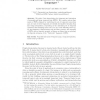3385 search results - page 53 / 677 » Language, Logic, and the Brain |
SLOGICA
2008
13 years 10 months ago
2008
Logic is a celebrated representation language because of its formal generality. But there are two senses in which a logic may be considered general, one that concerns a technical a...
TRS
2008
13 years 10 months ago
2008
A popular view is that the brain works in a similar way to a digital computer or a Universal Turing Machine by processing symbols. Psychophysical experiments and our amazing capabi...
CSL
2009
Springer
14 years 4 months ago
2009
Springer
We study Craig interpolation for fragments and extensions of propositional linear temporal logic (PLTL). We consider various fragments of PLTL obtained by restricting the set of te...
LICS
1994
IEEE
14 years 2 months ago
1994
IEEE
The theory of cut-free sequent proofs has been used to motivate and justify the design of a number of logic programming languages. Two such languages, Prolog and its linear logic ...
ICFP
2006
ACM
14 years 10 months ago
2006
ACM
In previous work, we proposed a Hoare Type Theory (HTT) which combines effectful higher-order functions, dependent types and Hoare Logic specifications into a unified framework. H...

